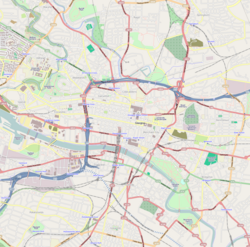| Glasgow Central Mosque | |
|---|---|
 | |
| Religion | |
| Affiliation | Sunni Islam |
| Ecclesiastical or organizational status | Mosque |
| Status | Active |
| Location | |
| Location | Glasgow, Scotland |
| Country | United Kingdom |
Location of the mosque in central Glasgow | |
| Geographic coordinates | 55°51′9″N4°15′3″W / 55.85250°N 4.25083°W |
| Architecture | |
| Architect(s) | Coleman Ballantine |
| Type | Mosque architecture |
| Style | Islamic |
| Completed | 1983 |
| Construction cost | £3 million |
| Specifications | |
| Capacity | 4,000 worshipers |
| Dome(s) | One |
| Minaret(s) | One |
| Materials | Old red sandstone |
| Website | |
| centralmosque | |
The Glasgow Central Mosque is a Sunni Deobandi [1] mosque, located on the south bank of the River Clyde in the Gorbals district of central Glasgow, Scotland, in the United Kingdom.
Contents
The Islamic Centre is the central institution for the local Muslim community, and is the largest community centre in Strathclyde. With capacity for 4,000 worshippers, it is Scotland's largest mosque. [2] The mosque was designed by Coleman Ballantine Partnership Architects in the Islamic style built in old red sandstone, and was completed in 1983. [3]

